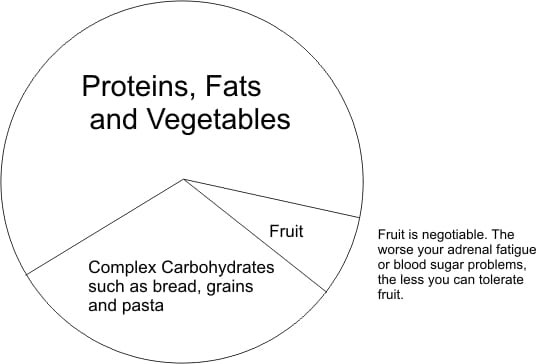Lower-Carb Mediterranean-Type Diet
The following will help balance blood sugar and hormone levels, help with adrenal fatigue, prevent ups and downs in energy and mood and promote weight loss. It is also an extremely heart-healthy diet plan.
How to Eat
- Eat every two hours. This relieves the stress handling glands from the job of maintaining normal blood sugar levels between meals (via epinephrine and cortisol).
- Do not eat carbohydrates alone; always add protein to your meals and snacks. It is especially important not to eat a carbohydrate-only breakfast.
- Avoid stimulants — caffeine, sugar, alcohol, etc. Stimulants work by provoking the stress handling glands into releasing epinephrine and cortisol to raise blood sugar and release energy.
- Avoid dead, devitalized and junk food. These foods cannot re-build a healthy body. They are also anti-nutrients–they rob any remaining nutrient stores from your body.
- Avoid trans-fats and rancid fats. Cell membranes, nerve tissue, and steroid hormones (vitality hormones) all require healthy fats. Unhealthy fats interfere with these functions and structures.
- Eat real, whole, fresh food. Minimize fruits and fruit juices. Most people will do well on a Mediterranean-type diet, combining some carbohydrates, protein and fat at each meal.
- Salt your food liberally with sea salt. Stress handling glands need plenty of salt for normal function. Research has proven that eating salt does not cause high blood pressure or heart disease. Only people with organ damage, like kidney disease, need to be concerned with keeping a low salt diet. In fact, low salt diets contribute to adrenal fatigue. Sea salt can be obtained from a health food store. It looks and tastes like “regular” salt, but contains trace minerals that have been refined out of “regular” salt. For a good source of “Real Salt” visit www.realsalt.com or call 800-FOR-SALT (800-367-7258).
- Drink plenty of water (filtered, or reliable source of spring water, NOT tap water).
What to Eat
- Eat food rich in Omega 3 fatty acids such as fatty cold water (not farm grown) fish, including salmon, tuna, trout, herring and mackerel. Eat walnuts, flax seeds and green leafy vegetables. Or, if you prefer, take an Omega 3 supplement such as Tuna Omega-3 Oil from Standard Process.
- Use monounsaturated oils, especially virgin or extra virgin olive oil as your primary oil/fat source. Note: Canola oil, although a monounsaturate, is highly refined, genetically-engineered oil with non of the benefits of olive oil.
- Eat seven or more servings of vegetables and fruits every day. Fruits are minimized during the first few months. Vegetables & fruits should be fresh or frozen (not canned). Vegetables can be slightly cooked, steamed, or eaten raw.
- Eat natural sources of good protein, (not man-made deli meats) and preferably organic meats (raised without estrogenic hormones and antibiotics).
- Eat more vegetable protein including peas, beans, lentils and nuts.
- Eat only organic whole grains (non-commercial), No refined carbohydrates (like white flour, white rice, white pasta, white sugar)
- The best breads are found in the frozen section of the health food store. Look for organic sprouted grain breads (sprouted grains have a higher protein and lower carbohydrate content than regular flour). These must be kept refrigerated.
- Minimize oils that are high in Omega 6 fatty acids, including corn, safflower, sunflower, soybean and cottonseed oils.
- Reduce our eliminate intake of trans-fatty acids (all hydrogenated oils), which are prevalent in margarine, vegetable shortening, and almost all commercially prepared packaged foods.
- Make simple carbohydrates (such as breads, past, and grains) your smallest food group.
The Mediterranean-Type Diet, also known as the Crete Diet and Omega Diet, was compared to the Standard American Heart Association Diet in the Lyon Diet Heart Study in 1994.
“Compared to those on the AHA diet, patients on the Mediterranean-Type Diet had an unprecedented 76% lower risk of dying from cardiovascular disease or suffering heart failure, heart attack or stroke! Remarkably, the new diet had proven more effective at saving lives than any other heart diet, drugs, lifestyle program or any combination of these elements.” (See The Omega Diet: Lifesaving Nutritional Program Based on the Diet of the Island of Crete, by Simpoulos, Artemis, P., M.D., and Jo Robinson, Harper Collins Publishers, Inc., 1999. pg 9.)
This is your plate. These are approximate recommended portions of the food groups discussed above:
Putting It All Together On The Plate
For ideas of what to eat that can be applied to the above directions, check out the document, meal plans to reduce sugar cravings, and also read these books:
- Why Can’t I lose Weight cookbook by Lorrie Medford, C.N., LDN Publishing 2001
- Nourishing Traditions: The Cookbook That Challenges Politically Correct Nutrition and the Diet Dictoracts by Sally Fallon and Mary Enig, PhD, NewTrends Publishing, Inc. 2001
Copyright 2006-2007 by Lang Integrative Health Seminars

